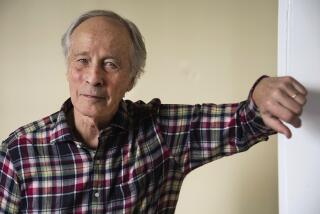COLUMN ONE : Collecting Dialect: No Fahdoodle : Frederic Cassidy, 84, has been cataloguing juicy colloquialisms for 26 years and his dictionary has reached the Hs. But don’t be a dinkeldorf. It’s ‘not a rapid science,’ he warns.
- Share via
MADISON, Wis. — In his own words, not the ones he speaks but the deliciously rich variety he hunts and hordes like precious boodle, Frederic Cassidy at 84 is far from being a washed up old foozle.
Sure, he’s been cataloguing uniquely American sayings since the hogs ate my brother up and, sure, after 26 years he’s only made it through those that start with the letter H.
But don’t be a dinkeldorf. Cassidy can still whip his weight in wildcats and any suggestion that he somehow won’t make it to Z is pure fahdoodle. After all, crafting a work as intricate as the nation’s first truly thorough and authoritative compendium of its varied dialects is something that’s got to be well fogged out. To do it right, it’s bound to take from here to Gypep.
“Lexicography is not a rapid science,” deadpanned Cassidy, uttering the sort of fancy term for dictionary writing more suited to a blue nose trying to put on the dogs.
Such $10 expressions are definitely not the stuff of Cassidy’s work: The Dictionary of American Regional English, an ambitious, groundbreaking and anything but expeditiously put together examination into the nooks and crannies of American speech.
DARE--the apt acronym for the project headquartered at the University of Wisconsin here--is not only a major work of American scholarship, it clearly is a major work in progress.
Conceived more than a century ago by the American Dialect Society, DARE didn’t get off the ground until the elite fraternity of linguists recruited Cassidy, a professor of English at the Madison campus, to direct the monumental task.
Fueled over the years by millions of dollars in both federal and private foundation grants, research began in 1965 when an army of field workers fanned across the 50 states. Armed with tape recorders and an elaborate list of 1,847 questions about what people called things, they searched for juicy colloquialisms that have spiced conversations in many locales for generations. Under the original timetable, the research was supposed to take five years and the collating and writing another five.
Instead, the mass of material was so great that Volume 1--which scratches a path merely from A (as in “acknowledge the corn,” an admission of drinking by someone in the nation’s midlands) to C (as in “Cupid’s cramp,” a Westernism for an infatuation)--offers up 14,000 entries by itself and wasn’t ready for publication until 1985. Volume 2, inching the genre from the likes of “dingclicker” (New Englandese for a fine person or thing) to “huggle-de-buck” (hurry up to a good-ole-boy from Texas) debuted only this autumn.
DARE, declared Allan Metcalf, the executive secretary of the Dialect Society, is the most sweeping scholarly effort ever devised to comprehend the richness of American English.
“Standard dictionaries don’t begin to scratch the surface of our language,” Metcalf explained. “Because of commercial and time limitations they, of necessity, must limit themselves to the most widespread forms of words . . . but (DARE) is providing a mine of materials to help us study language variation and language development. It’s like mapping the stars. We’re mapping the U.S. and until we do that our understanding of our language will be very superficial.”
There are, in essence, two forms of American English. There’s the refined version of most conventional dictionaries drawn in great measure from literature. To many, it’s the language of the kind of stuffy poops who always seem to know which is proper, “who” or “whom,” and like to preface their thoughts with snooty sounding things like “indeed,” “to be sure” and “thus.”
And then there’s the casual kind that most of the rest of us speak, the real world language ignored to a surprising degree by most dictionaries. “Most people who write take a different tone than when they speak and people who speak most colorfully don’t write at all,” explained Joan Hall, DARE’s associate editor.
In DARE, it’s the speakers who get their say. A trip through its pages is part Trivial Pursuit, part scholarship and part treasure hunt. For instance, Volume 2 reveals that a synonym for a pregnant woman in Connecticut is someone who is “Fat as God’s pocket.” If she were in the South, her midwife might be a “baby catcher.”
A “cow county” is the sticks to some in California and Nevada. In the Ozarks, a staggerer is someone who “antigoddles.” Nonsense can be “flumaddiddle” or “flummydiddle” or “fummaddiddle” in New England while in Alabama its “flurriddidle.”
In the Southeast, it’s said “there’s a dead cat on the line” to describe a sense that something’s wrong. Also in the South, a slippery person is one who shouldn’t be trusted “behind a thin dime standing edgewise.” A “dime-a-dip dinner” is a Nevada fund-raiser. A “dime on the counter” could be the unbuttoned fly of a California man.
Smooth operators in many parts of the country might try to “honeyfuggle” (sweet talk) a pretty girl. Depending on the locale, someone eager to get married might be “anxious for the noose,” “out on the carpet” or “dying to jump the broom” or even “window-shopping.” Or, it might be said that “bugs hit him” or that his “comb’s getting red.”
Women of the Ozarks and Appalachians who remain single even when younger sisters marry are “dancing in the hog trough.” And those who married poorly in the South and midlands have been said to have “driven their ducks to a poor market.”
Speaking of ducks, a sudden blast of anger or excitement in the South is sometimes called a “duck fit.” Adolescent Kentucky boys whose voices are changing are said to be going through their “gosling age.” In Pennsylvania, poor people have sometimes been identified as those who “crawled under the dog’s belly.” Eating light to a North Carolinian is to “drink some water and suck one’s thumb.”
On occasion, phrases get better as they migrate from place to place, especially put-downs. Someone without common sense in the Ozarks “doesn’t know enough to pour piss out of a boot with a hole in the toe.” In Texas, where everything is always grander, the same goofus “doesn’t know enough to pour piss out of a boot with a hole in the toe and directions on the heel.”
As DARE detectives scoured the country, they literally uncovered scores of different words for the same plants, animals and objects. Dust balls conjured up 176 names (dust bunnies, dust puppies, dust tigers, and collywobbles just to name a few).
More than two decades after they were completed, the foundation of DARE still remains those original interviews carried out between 1965 and 1970. Over that time, researchers quizzed natives of over 1,000 American communities about the words they used to describe everything from a rain shower (drizzle-fizzle in Missouri) to a flighty-person (flippy-wippet to some in New York).
The result was more than 2.5 million different responses, each of which must be computerized, collated, cross-referenced and researched. The process was complicated by a search for even more words in thousands of books, diaries and newspapers. “We all thought this would be done a whole lot faster than it has been,” confessed Hall. “But the more we investigated, the more we found.”
Without a doubt, the Dialect Society doyens didn’t pick Cassidy to edit their masterpiece because of his reputation for speed. Prior to DARE, his best known work was a single volume dictionary of Jamaican creole English. He started it in 1951 and finished 16 years later.
But the Jamaican work helped build Cassidy’s reputation as perhaps the country’s leading lexicographer. “He’s the very top,” said Virginia McDavid, president of the Dictionary Society of North America. “ . . . A number of scholars got their start with him . . . a lot of (important) people in the study of American English and English historical linguistics today are former students of Fred’s.”
And so the work on DARE has dared to stretch on into its fourth decade. The tardiness doesn’t seem to bother Cassidy a wit. “It’s a careful, slow deliberate process,” he explained. “You can’t whip those things off overnight. . . . The first part of the Oxford Dictionary was published in 1884 and it wasn’t finished until 1932.”
With two volumes under his belt, Cassidy thinks his team of 20 full- and part-time researchers can pick up the pace a bit. The next volume, I through O, could be ready by as soon as 1994, he predicted. The real killer comes with S, which could take up a whole volume unto itself.
“It’s going to take the rest of the century to finish it,” Cassidy said of the entire project. “We’ll get there, though.”
But, at 84, will he?
“I have something to live for,” he continued. “Lots of old people don’t. They’re just pattering along the last of it. Between discipline and luck I can probably make it to 100. We’re planning on it.”
In Virginia and Maryland, that’s what they’d call “finger-nosing” at old age.
Times Researcher Tracy Shryer also contributed to this story.
From the Dictionary of American Regional English:
* Absquatulate: A Midwesterner who departs hastily or furtively.
* Aggie forties: A stiff drink in the South.
* Air one’s lungs: Swearing or arguing at length in Illinois.
* Alight and look at one’s saddle: Texan’s invitation to stop, talk and perhaps share a meal.
* Alphabet slinger: A Georgia schoolteacher.
* Ankle express: Walking in the South and West.
* Astor’s pet horse: A Northerner’s catty referral to an overdressed female.
* Aunt Dinah’s picking her geese: Acknowledgment of a huge feathery snowfall in Kentucky.
* Barnyard golf: Horseshoes in the North.
* Pleased as a basketful of possum-heads: Exceedingly happy in Arkansas.
* Between hay and grass: A Northeastern male between youth and adulthood.
* Blow your horn if you don’t sell a fish: Said to a Cape Codder who blows his nose vigorously.
* Bone orchard: A cemetery.
* California prayer book: A deck of cards, especially during Gold Rush.
* Calluses on one’s feet: An Ozark baby born before its parents have been married nine months.
* Cat beer: Milk in Minnesota.
* Coffee strainer: A bushy mustache in Illinois
* Cumfluttered: A Tennessean when flustered or excited.
* Eat a pumpkin to a hollow through a crack in a board fence: Buck teeth in Florida.
* Drench one’s gizzard: Drinking to excess in Virginia.
* Elephant year: A bad luck year in black folklore.
* Flang-dang: A Texas party with music.
* Fluff duff: Anything fancy from food to finery.
* Goin’ jesse: Full of energy in Illinois.
* Ho-dad with a shufflin’ rod: A made-up item in New Mexico.
* Raisins with the mumps: Great Lakes Lumberjack’s prune.
* Very close veins: varicose veins.
More to Read
Sign up for Essential California
The most important California stories and recommendations in your inbox every morning.
You may occasionally receive promotional content from the Los Angeles Times.










